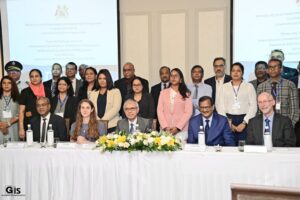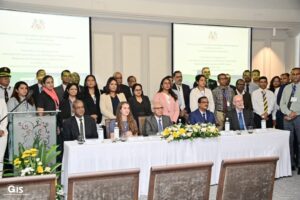Mauritius: Public officials assigned responsibilities under the National Oil Spill Contingency gathered this morning, at Le Labourdonnais Waterfront Hotel, in Port Louis, for a three-day Level 3 training course on Oil Pollution Preparedness, Response and Cooperation (OPRC).
The training is an initiative of the Ministry of Blue Economy, Marine Resources, Fisheries and Shipping in collaboration with the International Maritime Organisation (IMO).
The Vice-Prime Minister, Minister of Local Government and Disaster Risk Management, Dr Mohammad Anwar Husnoo, proceeded this morning with the opening ceremony of the training course in the presence of the Minister of Blue Economy, Marine Resources, Fisheries and Shipping, Sudheer Maudhoo, and other personalities.
The OPRC Convention came into force in Mauritius on 02 March 2000. Its main objectives are to facilitate international cooperation and mutual assistance in preparing for, and responding to, a marine pollution incident and encourage Parties to develop and maintain adequate capability to deal with oil pollution emergencies.
The three-day Level 3 training course aims to upskill key managers and administrators, on-scene commanders and other stakeholders on the safe, efficient and effective management of oil pollution.
Issues to be discussed during the training include the National Oil Spill Contingency Plan; response management and organisation; response policy; media relations; and claims and compensation related to international, national and local oil spills.
In his speech, the Vice-Prime Minister underlined that the grounding of the MV Wakashio caused an unprecedented ecological disaster impacting flora and fauna, the tourism industry and the livelihoods of fishermen.
He stated that the incident was an eye-opener for authorities to strengthen existing governance and institutional and operational mechanisms to manage better and lead future crises and emergencies in dynamic and complex environments.

Recalling the extent of the country’s Exclusive Economic Zone, Dr Husnoo affirmed that the Government was leaving no stone unturned in taking numerous actions to reinforce the capacity for preparedness, prevention and response to oil spills in Mauritian waters.
According to Dr Husnoo, the risk of oil spill incidents in Mauritian waters remained high with the passing of some 40,000 ships annually. He thus informed that the Government had sought the assistance of several countries and organisations to train the different local enforcement agencies in case of future oil spill incidents.
The Vice-Prime Minister seized the opportunity to thank the IMO for the aid extended under the Integrated Technical Cooperation Programme and its continued support.
He mentioned the various Level 1 and 2 IMO courses attended by officials from Mauritius regarding oil pollution, preparedness and response.
The Vice-Prime Minister also stressed that capacity building and training were essential to safeguard the lives of citizens, the vital functions of the economy and people’s livelihoods.
He believed that the training course would enhance participants’ knowledge to better understand the complexities of oil spill management and response while considering the political and media pressures, the legal and financial implications, public reaction and personnel safety, and post-operational requirements.







